Movie Review – Hobbit, The: An Unexpected Journey
After about forty minutes of Dwarvish “comedy” in Bilbo’s hobbit-hole, which sounds more like a euphemism than I anticipated, An Unexpected Journey starts to drag. The film takes an age to get going, with Jackson seemingly slavish to the literary foundations Tolkien established. Once this journey does kick off, however, the film gains momentum and maintains it until the very end – there’s battles, chases, monsters and some good-natured humor, all bringing a light-hearted feel to Middle Earth instead of “let’s throw the Ring into the pit of Mordor” we’re used to. An Unexpected Journey isn’t without pacing problems, and you can feel the bloated story starting to stretch the seams of audience acceptance, but overall, I welcome this return to Middle Earth and can’t wait to see the next installment.
– Summary –
Director : Peter Jackson
Year Of Release : 2012
Principal Cast : Martin Freeman, Ian McKellan, Richard Armitage, Graham McTavish, Ken Stott, Dean O’Gorman, Aidan Turner, Mark Hadlow, Jed Brophy, Adam Brown, John Callen, Peter Hambleton, William Kircher, James Nesbitt, Stephen Hunter, Christopher Lee, Elijah Wood, Orlando Bloom, Evangeline Lily, Andy Serkis, Hugo Weaving, Stephen Fry, Luke Evans, Cate Blanchett, Sylvester McCoy, Lee Pace, Jeffrey Thomas.
Approx Running Time : 169 Minutes
Synopsis: A young hobbit, Bilbo Baggins, is taken on a journey across Middle Earth by a group of Dwarves to reclaim a lost treasure. They are persued by a giant white orc, Azog, who is the sworn enemy of the Dwarven leader, Thorin Oakenshield.
What we think : After about forty minutes of Dwarvish “comedy” in Bilbo’s hobbit-hole, which sounds more like a euphemism than I anticipated, An Unexpected Journey starts to drag. The film takes an age to get going, with Jackson seemingly slavish to the literary foundations Tolkien established. Once this journey does kick off, however, the film gains momentum and maintains it until the very end – there’s battles, chases, monsters and some good-natured humor, all bringing a light-hearted feel to Middle Earth instead of “let’s throw the Ring into the pit of Mordor” we’re used to. An Unexpected Journey isn’t without pacing problems, and you can feel the bloated story starting to stretch the seams of audience acceptance, but overall, I welcome this return to Middle Earth and can’t wait to see the next installment.
**********************
More facial hair than a Kardashian family reunion.
And so we come to it at last; the great film experience of our time. Paraphrasing from Lord Of The Rings a little, The Hobbit sees the highly anticipated return of Peter Jackson to helming a film set in Middle Earth – this time, based on Tolkien’s earlier work to his seminal trilogy, from which the film derives its name. Trying to describe the hooplah and expectation surrounding this film is a little like doing the same for The Dark Knight Rises or The Avengers from earlier in 2012 – next to impossible. Whereas The Lord Of The Rings astonished audiences around the world with its attention to detail and meticulous film craft, and built up a following because of it, The Hobbit has a herculean task ahead of it to try and recapture the magic we’re all expecting. With the story split over not two but three films, the others to be released in 2013 and 2014, Jackson has the luxury of being able to expand Tolkien’s original book to its maximum potential: whereas the three-film epic of Lord Of The Rings still had to trim elements from the books, here, the dearth of narrative by comparison would seem to indicate that Jackson might need to “plump up” his arc to accommodate the rather lengthy running time. So how, nearly a decade on from his Rings triumph, has Jackson fared in bringing Tolkien’s other popular work to the big screen? Is it a fools errand, or is it destined to become a cinematic classic to stand alongside the other trilogy?
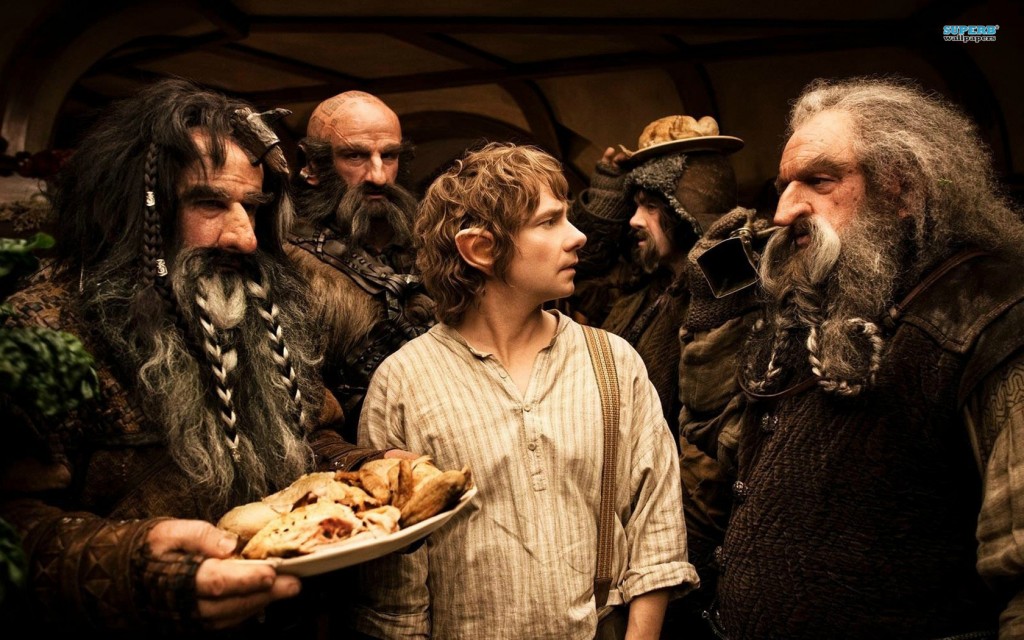
In the days and weeks leading up to Bilbo Baggins’s 111th birthday as shown in The Fellowship Of The Ring, Bilbo (Ian Holm and Martin Freeman) recounts his first adventures to a young Frodo (Elijah Wood). According to Bilbo, one evening Gandalf (Ian McKellan) and 12 dwarves arrive on his doorstep to begin a quest, a quest to which Bilbo isn’t immediately appreciative. The company of dwarves are led by Thorin Oakenshield (Richard Armitage), the son of a former Dwarf King, who oversaw the collapse of the Dwarf kingdom of Erebor by the dragon, Smaug, decades earlier. Thorin is seeking to reclaim the lost kingdom, as well as the enormous treasure within it, a treasure which is now guarded by the dragon. Bilbo is seconded to be the Company’s resident burglar, for it is apparent that hobbits have the ability to sneak about unheard and nearly unseen should they choose to: Bilbo is initially reluctant, but thankfully for this trilogy, he decides to go on the journey anyway. As they travel, the company is attacked by trolls, wargs and orcs, chased by Goblins through an enormous underground labyrinth, and pursued by a giant white orc who goes by the name Azog (Manu Bennett); it was Azog who fought Thorin at the battle of Erebor, and whom is now his sworn enemy.
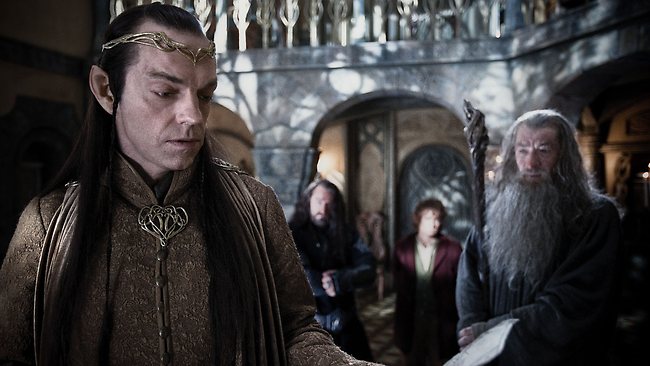
Let’s face it: no amount of awesomeness could ever stand up to the sheer weight of expectation that would come with Peter Jackson’s return to Middle Earth. Jackson could have made the greatest film in the history of mankind, cinema and the Universe, and people would still fault it because of their notions of what it should be like, instead of what it is. I guess that’s the thing about expectations, isn’t it? The Hobbit, Tolkien’s pre-Lord Of The Rings children’s novel, seemed too light-hearted and G-rated to sit comfortably into the dark, often brutal world Jackson created for Lord Of The Rings back in 2001-2003. At barely 300 pages, compared to Rings it was a mere trifle – that being said, the story within the pages of The Hobbit set up the foundations for Tolkien’s eventual masterwork, and shouldn’t ever be underrated. It’s a matter of fact that The Hobbit also contained linking material for Lord Of The Rings in that it gave us both Gollum and the Ring itself; the chapter known as “Riddles In The Dark” is probably the literary high-point of The Hobbit for what it gives us as background on a larger canvas. Yet, including even this, there was never enough material for Jackson to simply turn this into three films and have them be of a considerable length. There just wasn’t. Action Tolkien told in three paragraphs would never sustain even Jackson’s almighty penchant for visceral action on-screen, with the simplified narrative too narrow for an audience already content with the original Rings trilogy’s more broad-spectrum scope. In order to fill out some of the gaps in Tolkien’s novel, Jackson and his writing team – wife Fran Walsh and team player Phillippa Boyens, with a nod to one-time director Guillermo Del Toro – cribbed material from the only other untapped source the studio had the rights to: the appendices of the Lord Of The Rings. Using this material, and concocting some of their own, Jackson and his team have crafted a full-blown reality in The Hobbit where there was only ever the briefest, most thinly-described characters and scenarios.
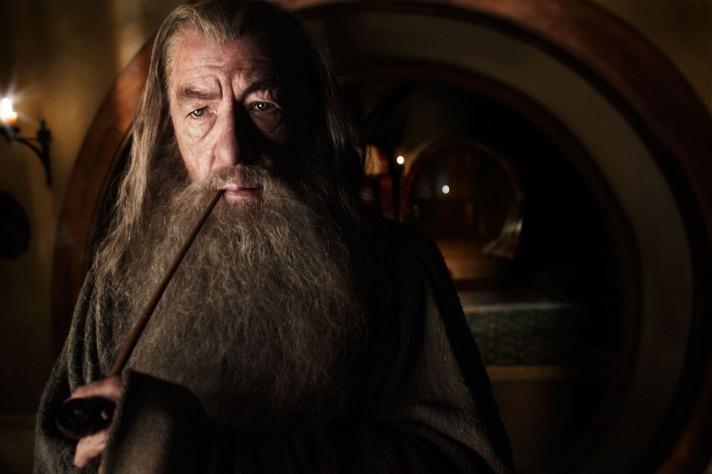
Whether this is a service or disservice to the story is probably best left to those with more knowledge of Tolkien than I. Suffice to say, Jackson brings us right back into the massive canvas that is Middle Earth with a resounding cheer, a modicum of restraint and a definitive vision for how this world should look. An Unexpected Journey covers the first half of Tolkien’s novel (a fact, I might add, which still has me worried for the next two films to cover the last half of it) and does so with a great sense of occasion and respect. Sure, Jackson embellishes a little lot, weaves dramatic license where there wasn’t any before, and gives us a new villain to hiss at in the form of Azog (who is a completely new character – more on him later) and enhances elements only hinted at by Tolkien himself; the truth of the story itself remains unhindered by any inevitable bloat, even if that bloat threatens to undo all Jackson’s good work. Past success doesn’t automatically grant you a pass to screw with things, Mr Jackson; it does grant you a little leeway to explore the extraneous narratives, but you’d better make sure you keep to the pathways and give the audience what they want.
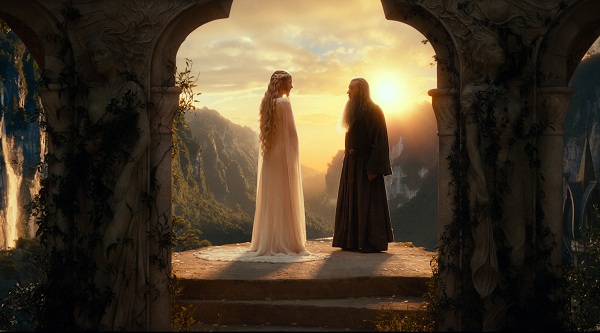
The story set-up is lengthy and elegantly told: the Dwarves are homeless, lacking in treasure, and they want it back. The key villains, a dragon in Smaug and a giant white orc in Azog, are introduced as a double-pronged motivation to progress the story. And you have the canvas of Middle Earth – with the most fantastic trove of creatures inhabiting it imaginable – to play with. An Unexpected Journey does start off quite slowly, however, and it’s here that the first problem for the film occurs. Pacing: Jackson’s never been that good at it, really. King Kong was a bloated mess in terms of pacing, with extended action sequences that went on and on and on, while we all know the multiple-endings for Return of The King have become something of a running gag across the interwebs. An Unexpected Journey, in trying to keep true to Tolkien, spends a great deal of time initially with the Dwarves in Bilbo’s home of Bag End, a sequence that alternatively dances between comedy and parody to serious dramatic catharsis, bookended by the formative narration introducing us to the Dwarven culture and the fall of Erebor. In doing so, Jackson provides some motivation for the intended quest to the audience, although he belabors the point to the extreme. The opening “lets go on a quest” sequence is inordinately lengthy, which will cause a lot of viewers some boredom, I think. There’s moments of levity, sure, and the characters all vie for screen-time and character moments, but by the time the second song (yes, there’s songs in this film) kicks off, you could feel the rest of the cinema audience shifting uneasily in their seats. It was getting to the point where after all this, surely the journey of the title wasn’t entirely “unexpected” any longer…. right?
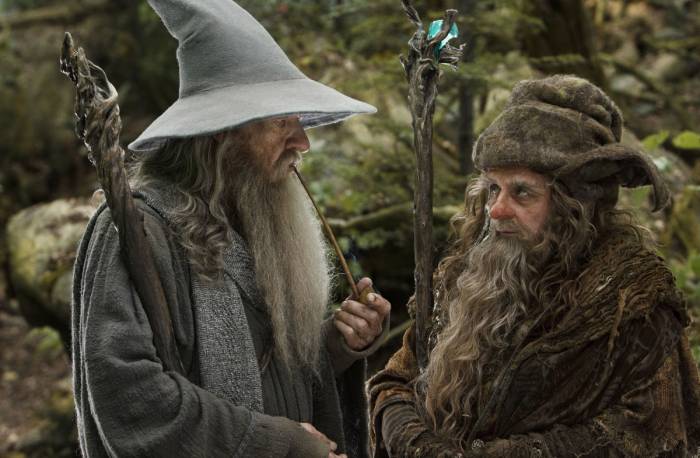
If you read the book, this scene is important to the story because it essentially sets up all the characters, gives them a mission, and starts off the quest aspect of the narrative. As a piece of text, it’s wonderfully written; and yet it’s the kind of scene that can’t be literally translated to the screen word-for-word, because the film medium is too unforgiving on lethargic and non-essential material for the cinema. Watching it, with the great camera angles and terrific nods to the previous Rings films (come to think of it, there are plenty of tips-o-the-hat to the Rings films sprinkled throughout this one) and the feeling of familiarity at being once more in Bag End, I was left bewildered at just how…. slow it was. Once the quest actually began, though, and our characters went out on the road, the film’s momentum changed starkly, and for the better. Instead of being lumped inside a room for forty minutes, the action could now start to unfold as the characters interacted with the rest of Middle Earth, and it was then that Jackson’s vision for the film began to truly take shape. Middle Earth is the Granddaddy of fantasy fiction creations – there’s evil orcs, goblins and Gollums, Elves, Dwarves and Men, while giant Bears, Eagles and super-fast rabbits exist much like you’d go to the zoo and expect to see a giraffe – and Jackson knows how to play this all like a well-tuned guitar. This is the playground he’s designed, and he takes us all for a glorious ride through it again.
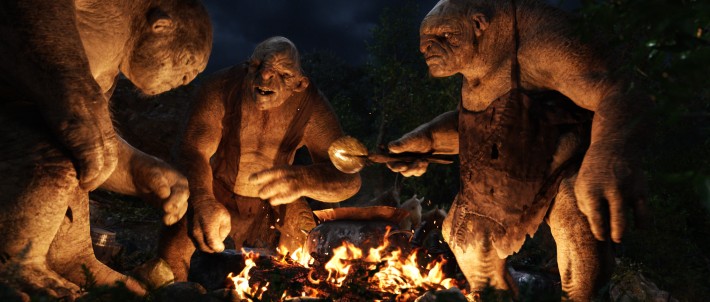
While the opening of the film is critically slow, and the latter two thirds move at a rapid clip, there are still elements of pacing that just feel… off… about it all. A scene not featured in the book, set in Rivendell with Gandalf, Galadriel (Cate Blanchett), Elrond (Hugo Weaving) and Saruman (Christopher Lee) discussing the appearance of a man calling himself “the Necromancer”, is designed to provide a link to Lord Of The Rings (spoiler for you guys, the Necromancer is a primordial form of Sauron) but adds nothing to the film itself save extending it by a good fifteen minutes; I understand why Jackson felt the need to include it, but by doing so, brings the film’s main narrative to a screeching halt. Plus, the characters in the scene seem to behave as if they’re from a different dimension to the ones we know – Elrond seems to act like he’s just left college and is hopped up on Viagra, Galadriel swans about looking beautiful and mysterious but adds nothing to the plot, while Christopher Lee seems confused by what he’s been asked to do as Saruman, as if he’s not even aware of being in the film! The scene just smacks of hubris on Jackson’s part; in trying to give more ties to the Rings trilogy, Jackson’s undermined the work he’s trying to accomplish here.
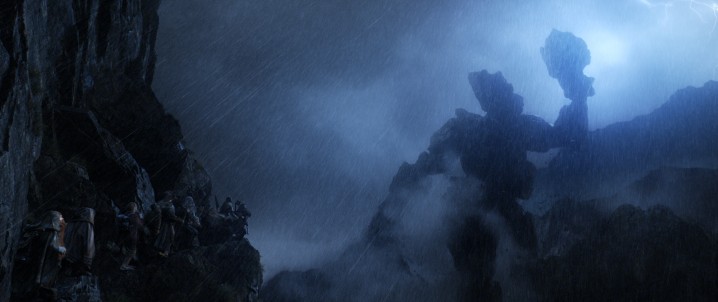
Also enhanced by Jackson is the role of Radagast The Brown, a wizard of the same order as Gandalf and Saruman, who communes with nature and is what you’d call the “hippie” version of Gandalf himself. Radagast is played by Sylvester McCoy, who starred as the seventh incarnation of Doctor Who, and who here is laboring under some pretty earthy makeup and costuming. McCoy plays the part well, although it does border on the cartoonish and, of all the elements in An Unexpected Journey that some might consider out of place, it’s him. Radagast is only ever really mentioned in Tolkien’s texts, yet Jackson sees fit to perhaps rectify the removal of Tom Bombadil in Rings and provide a naturist here for audiences to attach to. The role of Azog, the enormous, hulking, menacing figure with a hooked arm and scarred visage, fell to Manu Bennett, who gives the character a sense of thickness and virility, while maintaining a rage for the head of Thorin, his enemy. With Azog, the dramatic impetus of the film is heightened in that he’s chasing the Company across Middle Earth. It keeps the story moving along, as it were, and provides welcome tension along with it.
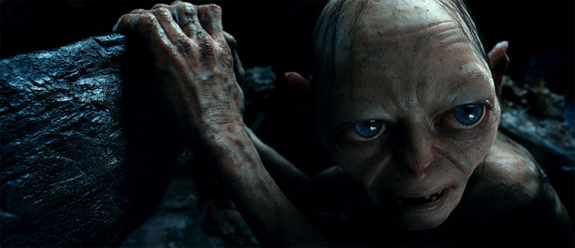
Central to the film are the trio of performances by Martin Freeman, as Bilbo, Ian McKellan as Gandalf (the grey version), and Richard Armitage as Thorin. Freeman, who actually looks more like a hobbit than any actor to portray one before him, does exceptionally well as Bilbo, bringing a lively cadence to his character that Ian Holm (who has an extended cameo at the opening as he remembers his first adventure) began all those years ago. Freeman does comedy well too, and Jackson and Co give Bilbo plenty of moments of levity even in the darker moments. Freeman’s also solid when it comes to the dramatic moments too, as noted with his relationship with Thorin, who plainly thinks little of the hobbit when it comes to danger and deception. Armitage, as Thorin, is Jackson’s new Aragorn – Thorin is less humanistic than Aragorn ever was, he is a potential King and knows it, and often acts like it. Thorin also highlights the stubborn streak of dwarves as well, and although this aspect of their natures could be hard to fathom for audiences, Armitage and his band of dwarvish actors all manage to balance this with a sense of worth and self-belief that translates well onto the screen. McKellan’s Gandalf is as magnificent as ever; I could watch this guy play Gandalf until the world ends and I’d still not be bored.
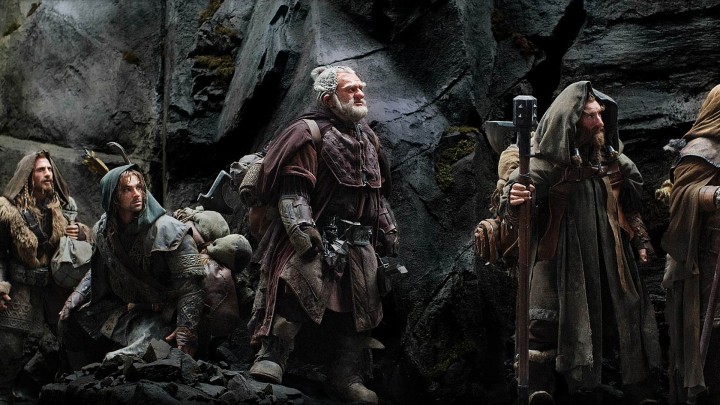
Then there’s the Dwarves. Thorin aside, the other 10 Dwarves do tend to blend into each other (with a couple of exceptions). Deep breath, here we go: Dwalin (Graham McTavish), Balin (Ken Stott), Kili and Fili (Aiden Turner and Dean O’Gorman respectively), Dori (Mark Hadlow), Nori (Jed Brophy), Ori (Adam Brown), Oin (JohnCallen), Gloin (Peter Hambelton), Bifur (William Kircher), Bofur (James Nesbitt) and Bombur (Stephen Hunter in his film debut) are the accompaniment, and for the most part seem to struggle to establish any real identity. Balin (who Rings fans will know was buried in the crypt in Moria as discovered by Gandalf and Co in Fellowship Of The Ring) is chief amongst Thorin’s advisers, being the oldest and wisest of the Company, and Ken Stott manages to provide some gravitas to the relatively small role. Fili and Kili have some minor comedy moments, and Aiden Turner and Dean O’Gorman do their best to be the “new kids on the block” as far as the hierarchy of dwarves goes. Stephen Hunter does little but eat and fall over – typical “fat jokes” material – as the oafish Bombur, described in the book as being fat and clumsy. In the book, I always felt that the Dwarves were a bunch of personality-free names Tolkien created just to sound cool. Saying rhyming names off the bat like Gandalf does a few times in the film, like a teacher at roll-call, is funny some of the time, but the script hasn’t the potency to really bring them to life. Jackson does enough to give each of the dwarves a “moment” to shine with a line of dialogue, act of bravery or other story device to thrust them into the limelight, but these moments are few for the majority. Here’s hoping for more in the next films.
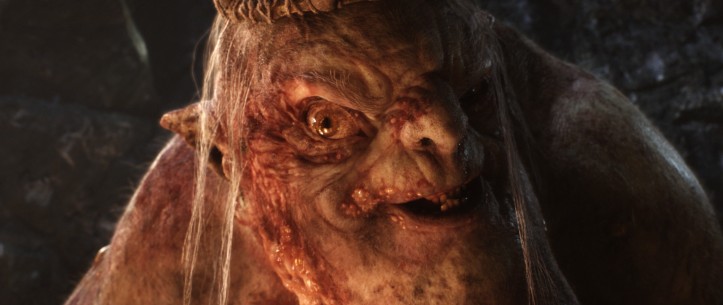
Regardless of what you think of the story of An Unexpected Journey, the film at least looks and sounds terrific. That sense of familiarity I mentioned earlier: it strikes you from the get-go just how much we’ve all missed Middle Earth. There’s the Shire, in all it’s green glory (although it actually only appears on screen for a few moments, as Bilbo races off on his adventure), the bristling mountains and deep forests of the world; I know it’s only New Zealand, but gosh darn it, I was glad to be back. As with the Rings trilogy, the production values on this film – indeed, the entire saga – is breathtaking, with the set design, costuming and CGI blending seamlessly to create a full, 360-degree world in which we journey, and it just feels like going home again. Rings DP Andrew Lesnie returns to Middle Earth to lens The Hobbit, giving a sense of visual continuity that is also as seamless as Jackson’s direction, while composer Howard Shore once again delivers a score that personifies each and every character and landscape we encounter. The Hobbit features thematic material from Lord of the Rings – the Shire theme, the theme for Gollum, brief reprisals of the Mines Of Moria moments are fully developed now for the Dwarves, while the overriding sense of wonder is again communicated with brass, timpani and eloquent strings.
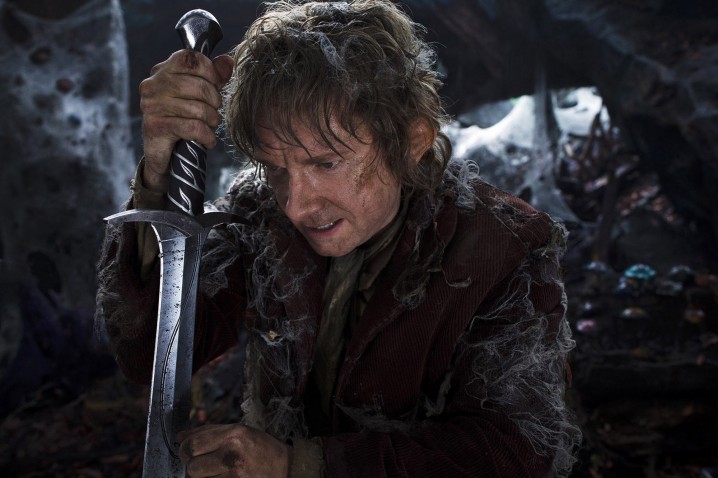
It’s hard for me to admit this, but even considering all the talent and expense un-spared to bring The Hobbit to life, I still feel as if the effort is misplaced to a certain degree. With Peter Jackson’s desire to fully explore Middle Earth and the story Tolkien wrote, spread luxuriously across three films, it was inevitable that the project became somewhat bloated. The film feels unbalanced at times, almost lethargic, lacking the brevity of time and the assured scripting from Lord Of The Rings to make a film that doesn’t just tell the story, it draws you diagrams as well. I understand Jackson’s (and Warner’s) desire to milk this teat for all it’s worth – after all, this is the last hurrah cinematically for Tolkien’s books, because for some reason the Tolkien estate hate the films…. why? – but they’ve done so at the expense of keeping this thing focused and tight. Admittedly Jackson’s embellishments get it right here and there; a massive sequence with the Dwarves escaping the Goblin King (a hideous CGI creature with what appears to be a scrotum on its chin, voiced by Barry Humphries) through a gargantuan labyrinth of tunnels and scaffolding is a highlight, and an extended fight between the Company and a trio of trolls, one of whom apparently wants to be a contestant on MasterChef, is fun in a spooky, “we’re gonna eat ya” kind of way. The famous “Riddles In the Dark” moment reminds us all of just how f*cking awesome Gollum is as a character; Andy Serkis provides the portrayal once again, giving Gollum a real sense of torment and vile cruelty – and there’s plenty of humor in this scene as well, thanks largely to Gollum’s split personality providing Bilbo plenty of confusion! This scene is worth the price of admission alone. The fact that we know what happens to Gollum in the end only serves to elicit more emotion from us as an audience, a factor I think Jackson’s canny enough to draw into the scene.
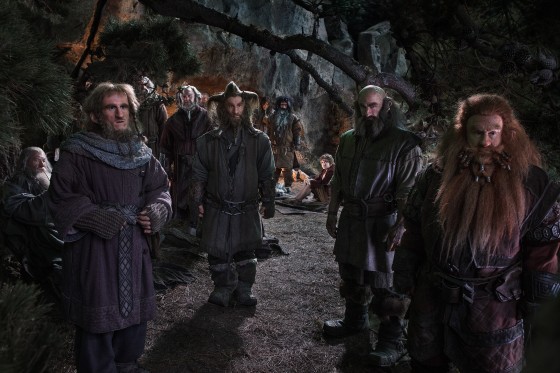
Is An Unexpected Journey a worthy entry into the cinematic legacy of Tolkien? Yes, yes it is. Is it a great film in its own right? No, it isn’t. But thankfully Jackson gets more right here than wrong, and even if the pacing of the opening act is terrible, the extra scenes (of which there’s going to be more in the 2nd and 3rd films) feel out of place or inadequate, and the Company of Dwarves tends to become a blur of beards and one-liners, it’s great to be back in Middle Earth. The CGI and visual style of the film is terrific (another Oscar for Andrew Lesnie here we come!) and the sense of continuity between The Hobbit and The Lord Of The Rings is seamless. While I doubt the middle-of-the-road audience members will grant Jackson some leeway to getting his story going in the way he does, for the most part I think we can say he’s done a pretty good job of it so far, faults and all. I still regret the decision to turn this enterprise into three films instead of two – I hope that doubt is dashed by the end of part 2, at least – and Jackson’s penchant for filling out his films with endless action sequences and an overabundance of “moments” might just kill this saga off; I hope he listens to the critics for the next two films – keep the pacing tight, get rid of a lot of the extraneous “could it be Sauron?” moments and focus on the task at hand, which is getting the Dwarves to Erebor and to that final confrontation with Smaug. And based on this film, I can only say that that sequence is going to be epic come film 3. An Unexpected Journey is a welcome return to Middle Earth, although it never quite manages to be as awe inspiring as any of the Rings films; that said, it’s eminently entertaining and certainly a worthy entry into the film canon.











He's got to up the pace for 2 & 3, surely!
One would hope so! Look promising so far!
Hoping the next installment cleans up the pacing issues, but I'm not holding out too much hope after this film. Though Thorin was awesome.
I just hopes Jackson listens to all those people hoping he gets that right in films 2 + 3!
I know where you're coming from in regards to the pace issues (as many have voiced similar concerns), but for me I never once felt the pace was too slow, boring, or wrong. I loved it from start to finish, and as a long-time reader, it was incredible to see a film actually follow the pace and progression of a novel. I understand where it bores people, but I was much too caught up in my enjoyment of the world to be bored. My favorite film so far this year, easily.
Peter Jackson took Tolkien's fairly sparse storytelling to new heights here, my favorite example of which is the backstory of Thorin Oakenshield. The scene in which they show how he receives the name of Oakenshield is so awesome, and when I got home I tried to find it in the book. I eventually tracked it down to a brief footnote in one of the LOTR appendices. "That's it?" I thought. Apparently so, but Jackson worked some serious magic on it. I'm an unabashed Peter Jackson fanboy going back a good 20 years, and I think The Hobbit is one of the greatest achievements in fantasy filmmaking… ever. Sure, LOTR is better, but so was the source material, so I don't think that should be held against it.
Oh, and beards! Some of the best beards… ever! Where's the honorary Oscar for beards?
My recent post Futures Passed — Connecting the Dots
Thanks Will. On your first point – the pacing – I'd hesitate to see how well you hold this film up in a couple of years after several re-viewings. I can see the first half hour of this film being skipped past on DVD to get to the action by more people than not, but I understand what you mean by its progression much like a novel. Trouble with that is that I didn't want to see a line-by-line retelling of the book, I wanted to see a cinematic version of the story, and as such felt the opening sequence was hampered by too much preamble and set up.
I agree with you on the origin of the name "Oakenshield"; that was a moment I really enjoyed, and it helped that it was a cool battle scene anyway. Jackson and his team have definitely done well to dredge out plenty of background detail to flesh out the limited material in the main text, but I feel they've chosen this route at the expense of narrative expediency, which might very well leave the next two films lacking in focus on Bilbo's story. Could prove a bad choice, but we won't know for another 12 months, I guess!
All that being said, I did enjoy the film anyway, but I just felt a little disappointed at some of the missteps on offer.
And not only should the Academy award a Best Beard Oscar each year, but also a gong for Best Scrotum-based character – that Goblin King dude was awesomely horrible!!
If there's an honorary Oscar for facial hair this year, it should go to Christoph Waltz and Don Johnson for Django.
I googled their characters in Django Unchained, Colin…. they'd HAVE to be in with a chance too!!! LOL
Thanks for dropping by!
If I wasn't already a massive Lord of the Rings fan from the original movie trilogy, then I don't think I would've tolerated a lot of the lengthy missteps this film took. There were parts of the film that were incredibly boring. That being said I did enjoy returning to that world again.
I am going to assume you're talking about the opening third of the film, Max, where things seem to drag on and on and on before the action really kicks in? I agree with you. Here's hoping PJ sorts out the pacing issues in the next two films!!